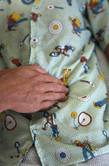Gut Bacteria Fights Inflammatory Bowel Disease
Mouse study finds molecule boosted cells eliminating colitis, Crohn's symptoms.
|
E-mail this article
Subscribe to news
Printer friendly version
|

(SOURCE: Harvard Medical School, news release, May 28, 2008)
WEDNESDAY, May 28 (HealthDay News) -- A molecule produced by intestinal bacteria can eliminate symptoms of inflammatory bowel disease (IBD) in mice, U.S. researchers say.
IBD includes Crohn's disease and ulcerative colitis.
It has long been known that the guts of humans and other mammals contain about 1,000 different species of bacteria that protect against infection and aid digestion. It has also been suspected that recent increases in asthma and certain food allergies may be due to disruptions in the delicate balance of the intestinal ecosystem, according to background information in the study.
Previous research has found that the sugar molecule polysaccharide A (PSA), which is produced by a species of intestinal bacteria called Bacteroides fragilis, boosted levels of immune system cells known to protect against colitis and Crohn's.
In this new study, researchers at Harvard Medical School, Brigham and Women's Hospital, and the California Institute of Technology infected immune-suppressed mice with a harmful bacteria called Helicobacter hepaticus. The mice quickly developed IBD.
But when B. fragilis was combined with H. hepaticus, the mice remained healthy. Further tests revealed that PSA produced by B. fragilis was a key factor in preventing IBD. The molecule does this by prompting immune cells to secrete an anti-inflammatory interleukin called IL-10, which suppresses the inflammation caused by IBD.
This is the first time a beneficial molecule produced by intestinal bacteria has been shown to be therapeutic in an animal model. The study is published in the May 29 issue of Nature.
The researchers said their finding demonstrates the potential for "good" bacteria to benefit human health.
"Given the sheer number of bacteria in the gut, the potential for discovering new molecules that can treat a whole range of these diseases is promising," study co-author Dennis Kasper, a professor of medicine and microbiology and molecular genetics at Harvard Medical School, and director of the Channing Laboratory at Brigham and Women's Hospital, said in a prepared statement.
More information
The Canadian Society of Intestinal Research has more about IBD. 
Copyright © 2008 ScoutNews, LLC. All rights reserved. 
HealthDayNews articles are derived from various sources and do not reflect federal policy. healthfinder.gov does not endorse opinions, products, or services that may appear in news stories. For more information on health topics in the news, visit the healthfinder.gov health library.